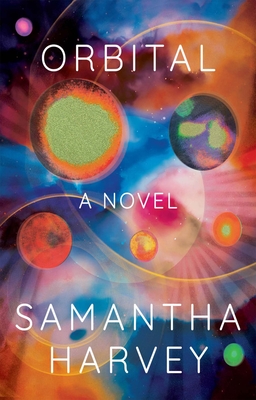- The Good: A meditation on Earth; gorgeous prose
- The Bad: Not really science fiction and barely a novel
- The Literary: Booker Prize Winner
A day in the life on the international space station is surprisingly mundane, yet breathtakingly awesome. Six astronauts and cosmonauts, American, Russian, Italian, British, and Japanese, leave behind their lives on Earth to collect data on one of the last space station missions before the program is dismantled. They reflect on the photos and talismans they brought with them as they behold their silent blue planet below.
Orbital is a surprisingly difficult novel to review. It’s classified as science fiction, but it’s not speculative. There’s barely any plot or drama or stakes. The characters don’t have distinguishable voices, and there’s no character development. But… I love it. It focuses on the beauty of space and its ability to humble and awe. It’s romantic, even pastoral. It’s powerful and optimistic. It’s a series of musings on philosophy and religion and the meaning of life.
Told over the course of a single day, the astronauts and cosmonauts perform official duties and tasks aboard the spacecraft. Each chapter covers a single 90-minute orbit around Earth, totaling 16 orbits over the course of 24 hours.
The distance of the astronauts and cosmonauts high above the earth isolates them from not only their own families and friends, but the rest of the humanity, which provokes feelings of loneliness and yearning. They watch and collect data as a super typhoon builds and makes landfall over the Philippines, wondering about the safety of the people below. They view the Aurora Australis as they pass near the Antarctic Circle. They study the Earth’s surface and see coastlines but not borders, except for the lighted boundary between Pakistan and India, and the political strife at home seems small and unnecessary. They work together on the station, laughing about the need to use two separate bathrooms because of the political machinations below, when all their urine is combined, filtered, and recycled into drinking water for them all to reuse. One astronaut performs a spacewalk, detailing the exhilaration of being out in the open vastness among the stars, tethered to the station by an insignificant rope, performing manual tasks as entire continents hurtle under their feet at 16,000 miles per hour. Another finds new meaning in Diego Velázquez’s painting Las Meninas, on a postcard his wife sent him.
I’ve read critiques that this novel glosses over critical contemporary issues we’re facing down here on Earth. The astronauts and cosmonauts do muse on climate change, but there’s little on specific political issues. With the presence of the Russian cosmonauts, some reviewers seem particularly upset about the lack of discussion of the Russian invasion of Ukraine. There are long lists of countries and landforms the astronauts see looking down on Earth, and I admit that Ukraine is never mentioned. Yes, the perspective is distinctly western, and Russia is a strong player in the history of the ISS. I would also argue that this book does exactly what it means to, distancing readers from man-made troubles, and showing the beauty and poetry in survival.
I find Orbital to be poetry adjacent—contemplative, transformative, and deeply resonant with what it means to be human. Highly recommended for anyone ready to leave their own problems for a few hours and see life with a fresh perspective.
